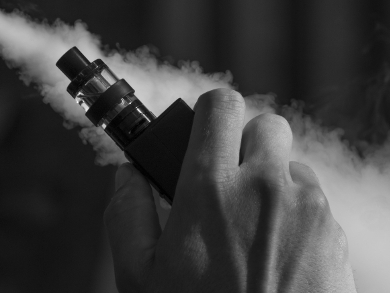E-cigarette smoking, or “vaping”, is often marketed as a healthier alternative to smoking tobacco. However, the long-term health effects of vaping still need to be studied.
Silvia Balbo, University of Minnesota, Minneapolis, USA, and colleagues have used mass spectrometry (MS) to analyze saliva samples and DNA damage in oral cells. Samples were collected from five e-cigarette smokers before and after vaping for 15 minutes. Reactive carbonyl compounds in saliva were derivatized with 2,4-dinitrophenylhydrazine to form hydrazones, which were then analyzed using an MS approach. The DNA from oral cells was isolated, hydrolyzed, and also analyzed using MS methods. The results were compared to non-smokers.
The team found significantly increased levels of three DNA-damaging compounds in the saliva samples after vaping: formaldehyde, acrolein, and methylglyoxal. In addition, four of the five e-cigarette users showed increased DNA damage, caused by the formation of acrolein–DNA adducts, compared with people who do not vape. This type of damage could ultimately lead to cancer if it is not repaired. According to the researchers, these preliminary findings warrant a closer look at the health effects of vaping. They plan a larger follow-up study.
Also of Interest
- The Air that I Breathe – Part 3,
Tunga Salthammer,
ChemViews Mag. 2018.
https://doi.org/10.1002/chemv.201700108
Emissions of e-cigarettes and other drugs - E-Cigarettes Cause DNA Damage,
Meghan Campbell,
ChemistryViews.org 2018.
Nicotine and its derivatives can damage DNA when vaporized and inhaled - Clever Picture: Nicotine – Chemistry of Smoking,
ChemViews Mag. 2016.
https://doi.org/10.1002/chemv.201600038
Why do we smoke nicotine and do not inject it?




